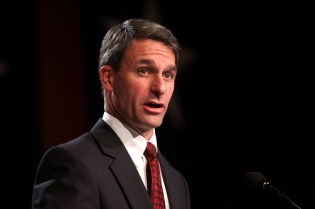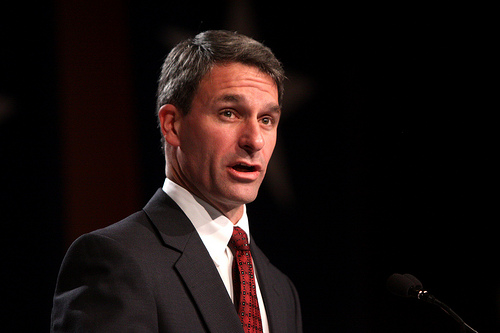
Ken Cuccinelli. (Photo by Gage Skidmore.)
It’s an absolute scandal: During tough economic times, a Virginia government employee has been caught red-handed misspending public funds to advance his political agenda on climate change.
If you think the allusion here is to former University of Virginia climate researcher Michael Mann, the author of the famous hockey stick graph on atmospheric temperatures and a favorite butt of climate-skeptic attacks, think again. Despite a hard-nosed corruption investigation led by Virginia Attorney General (and prominent climate denier) Ken Cuccinelli, every judicial body to examine the Mann case thus far, including several Virginia courts, the National Science Foundation [PDF], and a Penn State ethics panel, has rejected allegations that the professor fraudulently obtained public research dollars.
Unlike the case against Michael Mann, this scandal involves indisputable evidence of tax-dollar abuse. So, given his aggressiveness in the Mann case, how did Cuccinelli manage to let this more clear-cut case slip through the cracks?
Well, because people don’t tend to sue themselves, as a rule.
That’s right: When it comes to misusing public funds vis-à-vis climate change, no one is as blatantly culpable as Cuccinelli. For proof, we don’t have to look any further than his relentless prosecution of Mann. Despite the overwhelming lack of justification for the legal action, the attorney general continues to consume the resources of his office and the court system to perpetuate what is for all intents and purposes a personal ideological crusade against the climate scientist (and consequently climate science). And it isn’t just academics, climatologists, and voices on the left who have cried foul on Cuccinelli here. As New York Times blogger Andrew Revkin pointed out back in 2010, Cuccinelli has even caught flak from other prominent climate deniers such as Chip Knappenberger, who has warned of the chilling effect the attorney general’s “witch hunt” could have on university research work. But such wide-ranging rejections of his campaign against Mann haven’t deterred Cuccinelli in the least. After getting shot down in the lower courts, he’s now taken the case all the way to the Virginia Supreme Court, which, according to a recent Virginia Times Dispatch article, is expected to hand down a decision by March.
In his state of the commonwealth address earlier this month, Virginia Gov. Bob McDonnell boasted of his administration’s meticulous fiscal responsibility, and efforts to slash state spending over the past several years. Along the way, the government had to make some difficult belt-tightening decisions, from cutting public sector jobs, to slashing funding to the public schools.
Cuccinelli’s climate crusade is a hypocritical contradiction of the governor’s claim to be running a fiscally responsible government. Given the tough times, there’s a wide variety of ways Virginia tax dollars could be much more responsibly employed: from paying teachers and troopers, to investing in schools and public infrastructure, to energy development, retirement benefits, unemployment assistance, and on and on. Moreover, in light of Virginia’s particular vulnerability to climate change, Cuccinelli’s waste of public funds in an attempt to fuel climate denial is all the more reprehensible. Instead of throwing away those dollars on this absurd climate witch hunt, the government might consider using the money to act on the findings of its own climate change commission, which, in a 2008 report, found that the commercially important “Hampton Roads region is considered to be the second most populated region at risk from sea level and related storm damage after the New Orleans region.”
So forget “Climategate”; in Virginia, the real scandal is “Cuccinelli-gate.” Virginians deserve better than what they’re getting from their attorney general, and should flood his office with messages to let him know.



